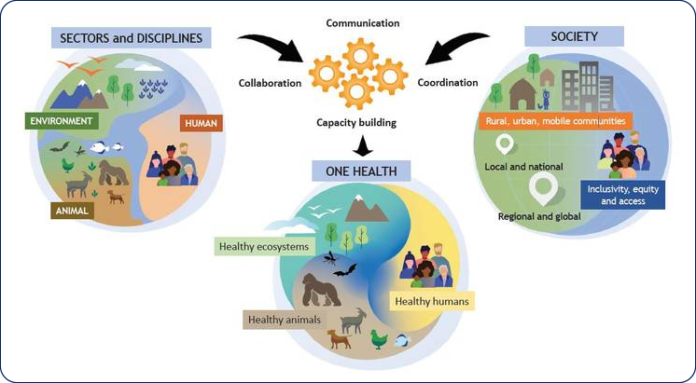ONE WORLD, ONE HEALTH: PREVENT ZOONOSES, STOP THE SPREAD
Sudhanya Nath1*, Chidambaranathan Arumugasami2
1Additional Veterinary Assistant Surgeon (PhD in Animal Nutrition), F&ARD Department, Block Veterinary Dispensary, Hemgir, Sundargarh-770013. Odisha, India
2Intern, Veterinary College and Research Institute – Tirunelveli, Ramayanpatti, Tirunelvel – 627358, Tamilnadu, India
*Corresponding author Email – sudhanyanath@yahoo.com
INTRODUCTION
In an interconnected world where borders blur and distances shrink, the concept of “One Health” has emerged as a pivotal approach to safeguarding both human and animal populations. At its core lies the recognition of the intricate interdependence between the health of humans, animals, and the environment. Central to this paradigm is the imperative to prevent zoonotic diseases—illnesses that transmit between animals and humans—and thereby mitigate their global spread.
ZOONOSES – A GLOBAL ISSUE
Zoonoses constitute a significant portion of infectious diseases affecting humans worldwide. Diseases such as Ebola, Zika virus, and the ongoing COVID-19 pandemic serve as stark reminders of the vulnerability posed by pathogens that cross species barriers. The origins of these diseases often trace back to human encroachment into wildlife habitats, illegal wildlife trade, or agricultural practices that bring humans and animals into closer contact. The ramifications are not confined to health alone but encompass socio-economic disruptions and strain on healthcare systems globally.
THE ONE HEALTH APPROACH
The “One Health” approach advocates for a holistic strategy that integrates veterinary, environmental, and public health disciplines. By understanding and addressing the ecological factors that facilitate zoonotic spillover, such as climate change, habitat loss, and urbanization, we can proactively prevent outbreaks. Surveillance systems that monitor animal populations for emerging pathogens play a crucial role in early detection and response. Timely identification allows for swift containment measures, preventing localized outbreaks from evolving into global pandemics.
HOW TO STOP THE SPREAD?
- Promoting responsible practices in animal husbandry and wildlife management is fundamental to reducing the risk of zoonotic transmission. This includes enforcing regulations against illegal wildlife trade and adopting sustainable farming practices that minimize human-animal contact. Vaccination programs for livestock not only protect animal health but also create barriers against pathogens that could potentially spill over to humans.
- Enhancing global collaboration and information sharing among nations and organizations. The rapid dissemination of accurate information during public health crises is essential for coordinating responses and implementing effective control measures. International bodies such as the World Health Organization (WHO) and the World Organisation for Animal Health (OIE) play pivotal roles in facilitating this collaboration and providing technical expertise.
- Education and community engagement are indispensable in fostering a culture of awareness and responsibility towards zoonotic diseases. Empowering communities with knowledge about disease transmission dynamics and encouraging proactive healthcare-seeking behavior can significantly reduce the incidence of zoonoses. Local involvement also ensures that interventions are culturally appropriate and sustainable in the long term.
CONCLUSION
The “One World, One Health” approach encapsulates a vision where the well-being of humans, animals, and the environment are intricately linked. Preventing zoonoses demands a concerted effort that transcends disciplinary boundaries and national borders. By investing in proactive measures—from surveillance and research to policy development and community engagement—we can curb the emergence and spread of zoonotic diseases. Ultimately, safeguarding global health requires collective action grounded in the principles of unity, cooperation, and shared responsibility towards a healthier future for all.
REFERENCES
- https://www.who.int/news-room/fact-sheets/detail/one-health
- https://www.woah.org/en/what-we-do/global-initiatives/one-health/
- https://www.ncbi.nlm.nih.gov/pmc/articles/PMC7232973/



